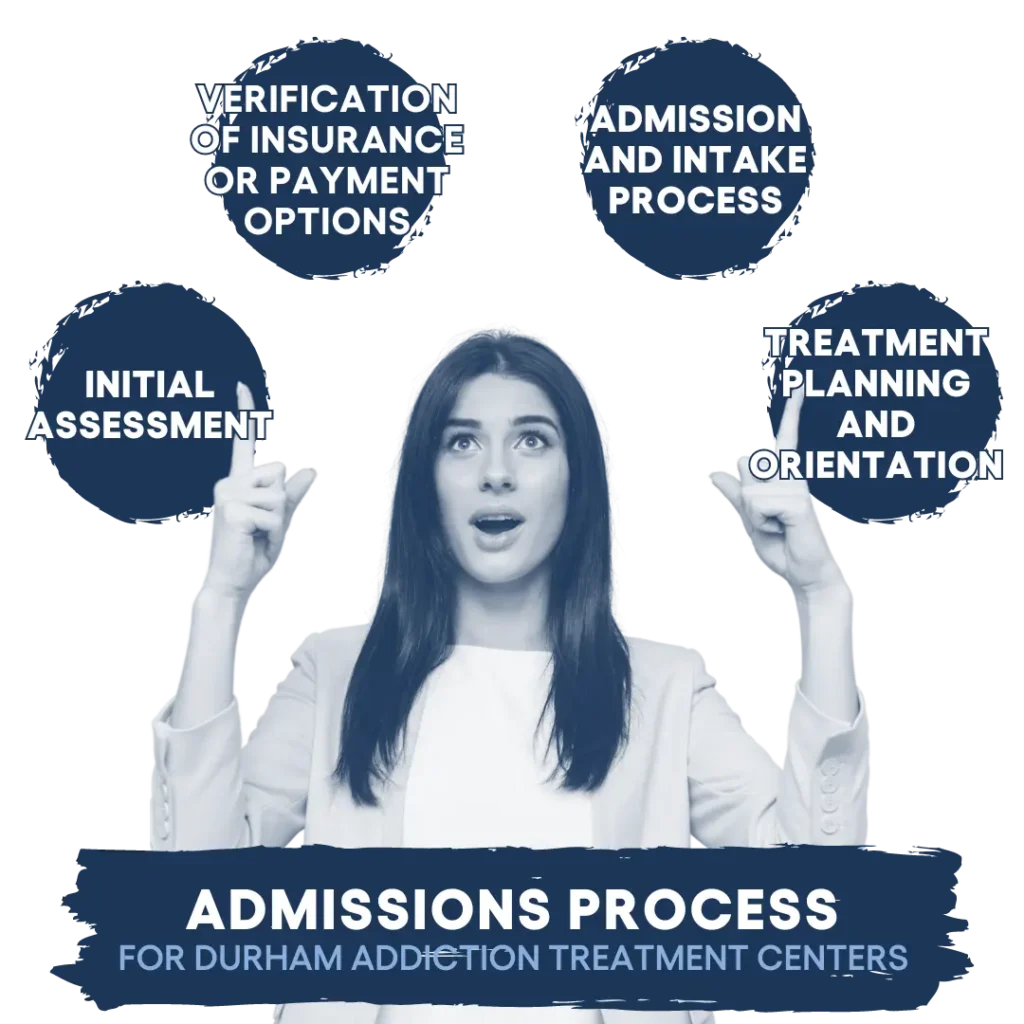If you are in the Durham area and need help with drug and alcohol addiction – call (704) 248-8561.

Durham is known as the “City of Medicine” – with a booming healthcare industry that includes over 300 medical and health related companies and medical practices. Even in a city focused on healthcare, many face struggles associated with addiction and mental health disorders. These addictions and mental health disorders can range in type and severity, including depression, anxiety, bipolar disorder, post-traumatic stress disorder (PTSD) and substance use addictions.
Durham offers a range of substance abuse and mental health disorder treatment options for anyone struggling with these challenges. These Durham drug treatment centers offer individuals guidance, community-based support, program opportunities, and more to aid in life-long sobriety.
Durham, NC, offers a variety of addiction treatment options catering to different needs, including both public and private facilities. Here’s an overview of the types of addiction treatment available in Durham:
Individual and Group Therapy: Essential components of many treatment programs, focusing on personal issues related to addiction and offering peer support.
Intensive Outpatient Program (IOP) and Outpatient Program (OP): These programs allow patients to live at home while undergoing treatment, suitable for those with a strong support system.
Medication-Assisted Treatment (MAT): Utilizes medications, like methadone and buprenorphine, along with counseling and behavioral therapies, to treat substance use disorders.
Inpatient and Residential Treatment: Offers a structured environment for addiction treatment, including 24/7 care and support.
Sober Living Homes: Provide a drug-free environment for individuals transitioning from an inpatient facility to the community.
Specialized Programs: Some centers offer programs tailored to specific groups, such as adolescents, pregnant women, and those with co-occurring mental health disorders.
Holistic and Alternative Treatments: Includes approaches like cognitive-behavioral therapy (CBT), motivational interviewing, and holistic therapies focusing on mind, body, and spirit healing.
Choosing a Durham drug treatment center is an important decision that requires careful consideration. Several factors should be considered to ensure that the chosen facility aligns with the individual's needs and offers comprehensive support for recovery.
Here are ten key considerations:
1. Accreditation and Licensing:
Ensure the facility is accredited by reputable organizations and licensed by relevant authorities. This ensures that the center meets certain standards of care and safety.
2. Treatment Approaches:
Different centers may offer various treatment approaches such as medical detox, behavioral therapy, holistic approaches, or medication-assisted treatment. Look for a center that provides evidence-based treatments tailored to individual needs.
3. Qualified Staff:
The expertise and qualifications of staff members, including counselors, therapists, and medical professionals, are crucial. Check if they are licensed, experienced, and specialized in addiction treatment.
4. Comprehensive Assessment:
A thorough assessment should be conducted upon admission to determine the individual’s specific needs and develop a personalized treatment plan.
5. Continuum of Care:
A good treatment center should offer a continuum of care, including detoxification, residential/inpatient treatment, outpatient programs, and aftercare services to support long-term recovery.
6. Family Involvement:
Family involvement can significantly impact recovery outcomes. Look for a center that offers family therapy, education, and support programs to involve loved ones in the recovery process.
7. Dual Diagnosis Treatment:
Many individuals with substance abuse issues also have co-occurring mental health disorders. Ensure the facility can address dual diagnosis cases by providing integrated treatment for both conditions.
8. Amenities and Environment:
The physical environment and amenities of the treatment center can influence comfort and well-being during recovery. Consider factors such as location, facilities, accommodations, and recreational activities.
9. Success Rates and Reviews:
Research the center’s success rates and read reviews from former clients or their families. While success rates can vary, positive testimonials and outcomes can provide insights into the center’s effectiveness.
10. Aftercare and Relapse Prevention:
Recovery is an ongoing process, and aftercare services are crucial for maintaining sobriety. Look for a center that offers robust aftercare planning, support groups, and resources to help individuals transition back to daily life and prevent relapse.

Durham provides a wealth of community resources, including support groups, counseling services, sober living homes, vocational training programs, and legal assistance for individuals dealing with substance abuse and mental health issues.
Here are a few addiction-related treatment resources available in Durham:
Durham County Public Health – Offers opioid, substance use, and addiction services for Durham residents.
Southeastern Recovery Center – Drug and Alcohol Addiction Treatment
SAMHSA National Helpline – Confidential, free help from public health agencies to find more information on addiction and mental health resources.

According to the North Carolina Department of Health and Human Services, an average of nine North Carolina residents died every day from drug overdoses in 2020. This was a 40% increase from 2019. The increase in overdose deaths has been driven by the use of illicit opioids, including heroin and fentanyl. 60% of the reported overdose deaths are reported to have involved multiple substances – and these numbers have only risen across North Carolina.
Compared to the previous two years, drug overdose deaths in North Carolina jumped 72% in 2021. The daily average number of deaths per day jumped to 11. When paired with mental health, North Carolina residents saw anxiety and depression rates skyrocket from 11% to 41% from 2019 to 2021.
Knowing and understanding the local statistics on drug and alcohol addiction can shed light on the prevalence and impact of substance abuse in Durham. These statistics can inform policy decisions, resource allocation, and community interventions aimed at addressing these addiction issues.
This is your first step toward addiction recovery! The admissions process for a Durham drug and alcohol rehabilitation center may vary depending on the internal processes and procedures of the facility, but in general, you can expect the following four steps:

The first step when seeking treatment is to undergo an initial assessment. This assessment may begin with a phone call or an in-person meeting with an admissions counselor or intake coordinator. During this assessment, the individual will be asked questions about their substance use history, medical history, mental health concerns, and any previous treatment experiences. This assessment is to gather information to determine the most appropriate level of care and treatment plan for the individual.
After the initial assessment, the admissions team will assist in verifying insurance coverage or help with exploring other payment options if insurance is not applicable. They will work with the individual to understand their financial situation and determine the best course of action for covering the cost of treatment. If the individual has insurance coverage, the admissions team will talk with the insurance provider to determine coverage for substance abuse treatment services.
Once the financial arrangements have been sorted out, the individual will start the admission and intake process. This part of the process involves completing paperwork, signing consent forms, and providing necessary personal information. The admissions team will also provide information about what to expect during treatment, including rules and expectations, daily schedules, and available support services.
After completing the admission and intake process, the individual will meet with an experienced treatment team to develop a personalized treatment plan. This treatment plan will outline goals for recovery, as well as the specific therapies and interventions that will be used to achieve those goals. The individual will participate in orientation to the rehab facility, including a tour of the facility and an introduction to staff members and fellow clients.
AA (Alcoholics Anonymous) and NA (Narcotics Anonymous) meetings are vital support groups for individuals struggling with addiction in Durham. These meetings provide a safe and confidential space where individuals can share their experiences, struggles, and triumphs with others who understand the challenges of addiction.
By following a 12-step program, participants gain valuable tools for maintaining sobriety and rebuilding their lives. These meetings offer a sense of community and belonging, nurturing connections with peers who offer empathy, encouragement, and accountability. Through regular attendance and active participation, individuals can break the cycle of addiction, rebuild their relationships, and reclaim control over their lives, ultimately achieving long-term sobriety and fulfillment.
To find local meetings, call 800-681-2956 – or check out a list below to get started.
To find local meetings (in-person and virtual), click here – or check out the list below.
Staying sober shouldn’t be a solo activity – there are sober-friendly activities that individuals can do with family and friends in Durham. These activities range from outdoor recreation, art exhibits, support group meetings, and more. Engaging in sober activities can promote social connections and enhance the overall attitude about recovery.
Here are some sober activities you can do in Durham:
5 Points Gallery – Located in downtown Durham, artists at 5 Points Gallery live and work locally, showcasing their contemporary artwork.
Angel Island Fun Park – Fun for the whole family including VR gaming, go-karts, and more, hourly, and daily packages available.
Duke Basketball Museum and Sports Hall of Fame – Great for basketball enthusiasts, see a history and hall of fame of the infamous Duke basketball team.
Durham Symphony Orchestra – Celebrating their 75th anniversary, Durham’s symphony is “where great music happens!”
Forest Hills Park – Something for every member of the family to enjoy the great outdoors, including a pool, pickleball, playground, tennis courts, and more.

Paying for addiction treatment in Durham, North Carolina, can be challenging, but there are several avenues to explore to make it more manageable. It is important to explore all the available options for treatment – the financial aspect of treatment should not deter you from finding help. Here are some ways to pay for addiction treatment in Durham:
Many health insurance plans, including private insurance, Medicaid, and Medicare, offer coverage for addiction treatment services. Contact your insurance provider to understand your coverage and benefits for substance abuse treatment.
North Carolina offers state-funded addiction treatment programs that provide services at reduced or no cost for individuals who meet certain eligibility criteria. You can inquire about these programs through local government agencies or treatment centers.
Some addiction treatment centers in Durham offer sliding scale fees based on income and ability to pay. This can make treatment more affordable for individuals with limited financial resources.
If you’re employed, check if your workplace offers an EAP that provides coverage or financial assistance for addiction treatment services. EAPs often include counseling and referral services for employees and their families.
There are nonprofit organizations and charities in Durham that provide financial assistance or scholarships for addiction treatment. These organizations may offer grants or subsidies to help cover treatment costs.
Some addiction treatment centers offer flexible payment plans or financing options to help individuals spread the cost of treatment over time. Inquire about these options when researching treatment facilities.
Consider organizing a crowdfunding campaign or fundraising events to raise money for addiction treatment expenses. Online platforms make it easy to reach out to friends, family, and the community for support.
Durham offers a variety of addiction treatment programs, including outpatient, intensive outpatient, residential, and detoxification programs. These programs may incorporate therapy, counseling, medication-assisted treatment, and support groups.
The best addiction treatment program depends on individual needs, preferences, and the severity of the addiction. A comprehensive assessment by a qualified professional can help determine the most appropriate level of care and treatment approach.
Many health insurance plans, including private insurance, Medicaid, and Medicare, offer coverage for addiction treatment services in Durham. It's important to check your insurance policy for specific coverage details and benefits.
The duration of addiction treatment varies depending on individual needs and the specific program. Treatment may range from a few weeks to several months, with some individuals continuing with aftercare services for ongoing support.
Addiction treatment in Durham may incorporate various evidence-based therapies, including cognitive-behavioral therapy (CBT), motivational interviewing, dialectical behavior therapy (DBT), family therapy, and group therapy.
Durham offers support groups such as Narcotics Anonymous (NA), Alcoholics Anonymous (AA), and SMART Recovery, as well as aftercare programs provided by treatment centers to help individuals maintain sobriety and prevent relapse.
